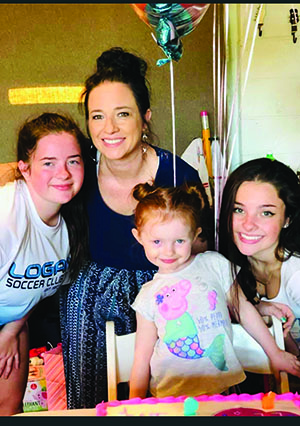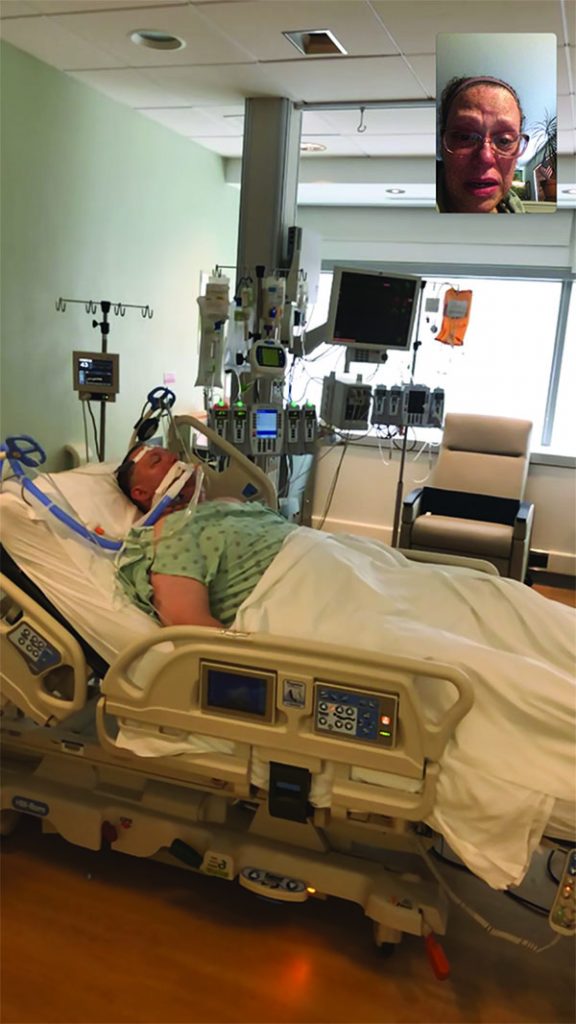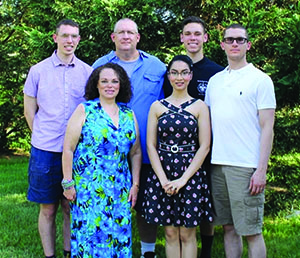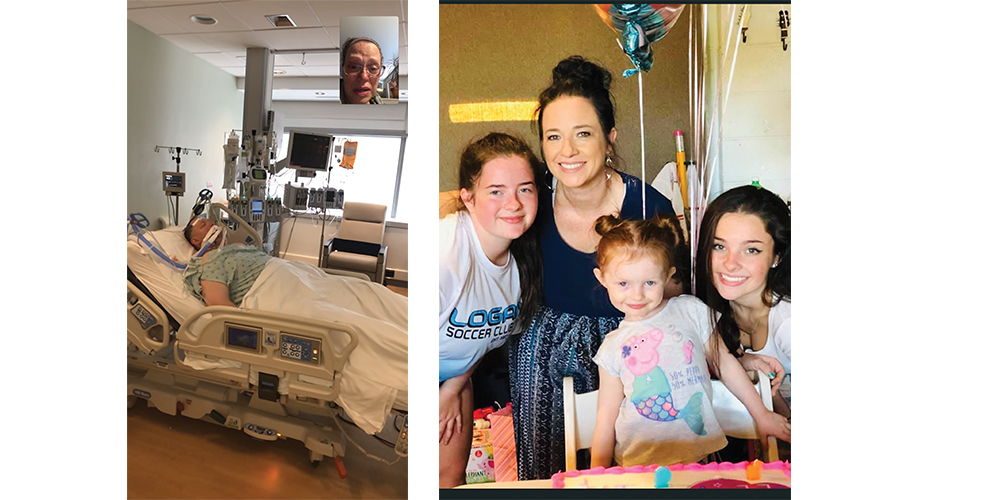Spending more time at home these past several months has given many of us ample time for personal reflection and contemplation. The suffering many have faced during this pandemic has taught some of us to live in the present and appreciate what we have.
But for those who have suffered and are still suffering, how are they coping? This month’s story introduces you to two inspiring individuals who are facing unspeakable adversity yet still embrace the spirit of Thanksgiving.
Facing a cancer diagnosis during “normal” times is hard enough. But facing it during a pandemic makes it all the more challenging, and all the more uncertain.

Thirty-nine-year-old Logan Township resident Brenda Fisher was diagnosed with cervical cancer in September of 2019. She faced a radical hysterectomy in November, and due to the required six-week bed-rest, lost her job.
Fisher found a new job, but then in February, her cancer came back. She endured chemotherapy and radiation while working full-time.
Fisher then faced a three-week treatment of brachytherapy, a form of internal radiation, for which she had to travel to New Brunswick. “The treatment was horrible,” she recalled.
After the brachytherapy, Fisher’s body was wiped out from all the treatments, and needed a break. But she continued working full-time and raising her three daughters with her husband William, all while trying to recover and gain back her strength.
Then in September of this year, Fisher caught COVID. Luckily, she had a “mild” case, with body aches, a dull headache, shortness of breath, loss of smell, and fatigue.
Last month, Fisher went for another oncology follow-up, only to get the bad news that the cancer had spread to the outside of her bladder. “I am now waiting to get my port put in and will be starting a higher dosage of chemo. This round will last six months.”
Fisher admitted that the stress is very hard. “I am physically feeling okay now, but when my next round of chemo starts, I won’t be. And that’s very scary and stressful to think about. I am just trying to prepare myself for that.”
“In the last year alone, I have had three cancer diagnoses and COVID. How can I not be stressed? But having kids makes you push forward and makes you want what’s best for them, and what’s best for them is a happy, strong mommy, so that’s what I portray.”
Another, less talked-about reality of having cancer during a pandemic is being without support of a friend or family member during appointments and treatments.
“It makes it lonely and sad,” Fisher confided. “You are not sure if you’re getting the information correctly because your mind is kind of numb anytime you are talking to a doctor.”
Despite all of this, Fisher is a very strong woman who remains thankful for her tight-knit family.
“My family is my lifeline. My husband (who also works full-time) has been taking amazing care of our four-year-old and my older daughters have been helping with their baby sister and getting their school work done without asking for much help. I’m also grateful that my husband is an amazing cook and has taken over the meals.”
Fisher’s extended family has also really stepped up for her, offering both emotional and logistical support.
“My father (who recently had major back surgery) drove me to and from appointments when I was unable to drive. My mother checks on me daily. My sister just had a baby a few weeks ago, yet still has time to make sure I am ok.”
“I have had many offers from friends about bringing dinners, meals, anything I need. My relatives have brought me gifts and everyone around me has been very supportive.”
“I am very lucky to have them all,” Fisher emphasized.
“I also cannot praise my boss enough for the patience he has had with me,” Fisher continued. “My tests, lab appointments, doctor appointments, etc. I miss quite a bit of time and I have barely been here eight months. He is very understanding and flexible and I am not sure I would find that anywhere else.”
Fisher works as the office manager for Patriot Sprinkler Company in Mickleton. Her boss is president, John McSparran.
McSparran’s perspective underscores the importance of being an understanding boss to a proficient and dedicated employee.
“Brenda is a very hard worker, trustworthy. She takes charge, and that’s what you need in an office manager,” he began. “With everything she is going through, she never brings her problems to work and always seems to be good-spirited. When she’s at work, she is always upbeat and makes my day easier.”
When it comes to COVID, one area resident suffered a devastating case with long-term consequences.
Fifty-two-year-old Michael George of Woolwich Township and his wife Janice, both Dessert Storm veterans, share a compelling story of struggle and survival.
This time, the enemy is COVID-19, and Michael is still fighting.
In March, Michael, Janice, and their son Andrew all contracted COVID.
“This happened to us very early on. No one was wearing masks yet and six feet apart was not being talked about yet. This was so early that at first our doctor thought it was some other random virus,” relayed Janice.
“Within a week I had to take Michael to the hospital, and by then Andrew and I had full blown COVID.” While Andrew, and especially Janice, had serious symptoms, they did not need to be hospitalized.

“Nothing in my life could have ever prepared me for the pain, fear, and loneliness of having to drop my husband off and not be allowed to stay with him,” Janice recalled of the March 28 date that Michael was admitted to Cooper Hospital.
Michael, who is overweight but has no other underlying conditions, developed pneumonia quickly, and it was downhill from there. Janice offered an apt metaphor.
“The virus is like a hurricane. “The storm is scary and hard, but the aftermath takes even longer to get through—pneumonia, MRSA, urinary tract infection, blood pressure issues, oxygen levels, the list goes on.”
Michael was intubated in the ICU on March 31. Michael fought against the ventilator, so they had to increase his sedation.
Then Michael’s nurses decided to occasionally set up a phone so he could hear Janice and Andrew’s voices. This helped him calm down and allow the treatments.
Michael was still not getting enough oxygen to his organs, and was not expelling carbon dioxide—a very dangerous situation. So, from April 6-15, Michael was hooked up to an ECMO Circuit, a treatment that only the day prior was approved for COVID patients. The circuit essentially removed his blood, added oxygen and removed CO2, and put the ‘cleansed’ blood back into his body.
Janice emphasized how grateful they are that Cooper had access to the ECMO circuit and that he was probably the first person in the state, and possible the country, to receive this treatment for COVID. “We have no doubt that this machine saved his life.
On April 31, Michael was moved to a special facility in Delaware to wean him off the ventilator, which was removed on May 6. Then on May 9, his tracheotomy was removed.
Michael was then sent to a rehab facility in Bryn Mawr, PA on May 13 where he received physical, occupational and speech therapy.
“Once Michael got to Bryn Mawr he set personal goals. He was going to walk out of there on his own two feet, he was going to feed himself, dress himself, and take care of his personal hygiene,” recalled Janice.
Michael met his goals, and was sent home on June 9. He had been away for 74 days.

Once home, Michael continued receiving therapy and visiting nurse care for a few weeks. Four months later, he is back to driving, riding his lawn mower, working full-time remotely, and cooking some meals—always a treat for his family.
But Michael continues his battle against COVID. “He has residual issues of low iron which makes him tired more easily,” began Janice.
“A more long-term and maybe even permanent issue is the nerve damage in both hands. He has chronic pain in his hands and does not have full control of his ring and pinky fingers in both hands. We have to wait a few more months to see if this is as good as it gets, but we’ll take this over the alternative,” explained Janice.
Janice, Michael, and Andrew and the rest of their family have been through an incredible ordeal. But this close and resilient family is supported by a huge community of supporters who uplift them with constant help, prayer, support, encouragement, gifts, meals, and more.
Janice also credits their faith for getting them through these grueling last few months.
“We are members of St. Clare of Assisi Parish right here in Swedesboro. But our faith goes so much further than a building. God brought so many amazing people into our lives. Old friends and new friends that stuck by us, lifting us up in prayer, and also taking care of our physical needs on a daily basis.”
Janice also created and shared an online journal of Michael’s COVID experience, which was cathartic for her, but also allowed community members near and far to offer prayers and online support.
Janice herself still suffers bouts of vertigo from COVID, and Michael’s infection has afflicted Andrew and her in other ways.
She explained: “Michael and I did seek counseling for Andrew and me. We started to exhibit what I can only call PTSD. Any time the phone rang, our hearts raced and we would break out in sweats. We both had a very difficult time sleeping and the feeling of dread was always lurking. Even to this day we still have nightmares and sometimes I look over at Michael, and the tears just start to flow.
Janice says there’s a little-talked-about group of people like Michael who contract COVID.
“People think you have COVID and you are okay in 14 days, or you die. There is a third group, the long-haulers, who have the residual effects, and no one knows how long these effects will last.”
Janice is also forever grateful to those she calls healthcare “angels” who took care of Michael, but were also consistently kind and compassionate communicators to her and Andrew.
“There are not enough words for me to express my gratitude to our frontline heroes. We are forever in your debt and you will always be in our prayers and in our hearts.”
Janice also emphasized that her family can never repay all the local people who stood by them, but she promises to pay it forward.
“Swedesboro–Woolwich is an amazing community and we are so blessed to call this town home,” she concluded.
By Colleen Woods-Esposito







